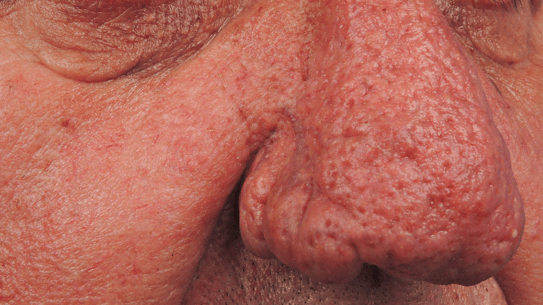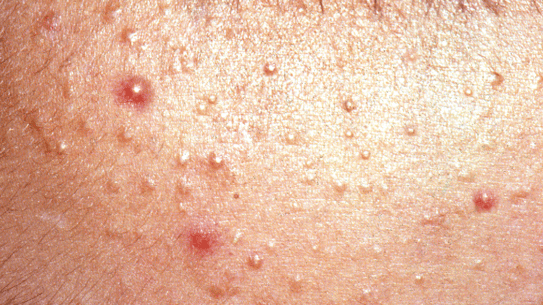1 professionals
Rosacea: Clinic, diagnosis and treatment
Rosacea: Clinic, diagnosis and treatment
Medical editor: Dr. Pierre Schneider, Dermatologist, Saint-Louis Hospital, France
By

Dr. Pierre Schneider
Related topics
The precise etiology of rosacea remains unknown; however, several factors are thought to be involved in its development:
The physiopathology of rosacea is complex and multifactorial.
The diagnosis of rosacea is mainly based on the clinical examination of the skin. It is usually carried out by a dermatologist or a general practitioner. Diagnosis criteria include the appearance of redness and pimples on the face, as well as dilated blood vessels (telangiectasias) and changes in the nose (rhinophyma) in severe cases.
There are different subtypes of rosacea, each with specific symptoms1,2:
Fig: Phymatous rosacea

Differential diagnoses for rosacea1 include:
Eczema is a skin disease characterized by redness, itching and flaking, which may resemble rosacea on the face.
Fig: Eczema

Acne is a common skin condition characterized by pimples, blackheads and cysts, which may resemble the papulopustular form of rosacea.
Fig: Acne

Seborrheic dermatitis is a skin disease characterized by redness and flaking, which can resemble rosacea on the face.
It is an autoimmune disease that can cause redness and skin lesions similar to rosacea.
Some medications (mainly corticosteroid creams) can cause redness and skin lesions similar to rosacea, which is why it is important to take the patient's medication history in consideration.
There are different types of topical treatments for rosacea. The main active ingredients used in these treatments are erythromycin, metronidazole, azithromycin, vitamin A, benzoyl peroxide and retinoids1-6.
Should I avoid the sun and the cold?
Should the sun be avoided as a preventative measure? What are the seasons for which less photoprotection can be used?
From what age can laser therapy be used?
Are there any contraindications to accessing hot baths or swimming pools?
Is there a genetic component involved in rosacea (a mother who is very embarrassed by her rosacea may fear that her child may be affected)? If yes, what preventative measures should be taken to limit the pathology from an early age?
Can a pregnancy mask hide the appearance of rosacea?


Advocacy for a shared physician/patient approach for the management of acne, rosacea, seborrheic dermatitis and photodamage


Burden of Sensitive Skin (BoSS) questionnaire and current perception threshold: use as diagnostic tools for sensitive skin syndrome

Sensitive skin in China: characteristics and burden
Create easily your professional account
I create my accountGet access to exclusive dermatological services to increase your professionnal knowledge: +500 pathology visuals, clinical cases, expert videos
Benefit from valuable features: audio listening, materials to be shared with your patients
Stay informed about the upcoming events and webinars, latest scientific publications and product innovations